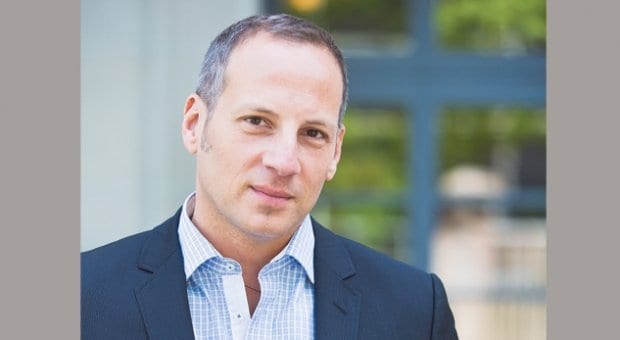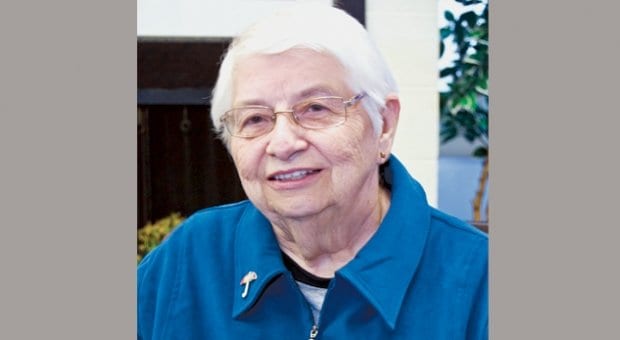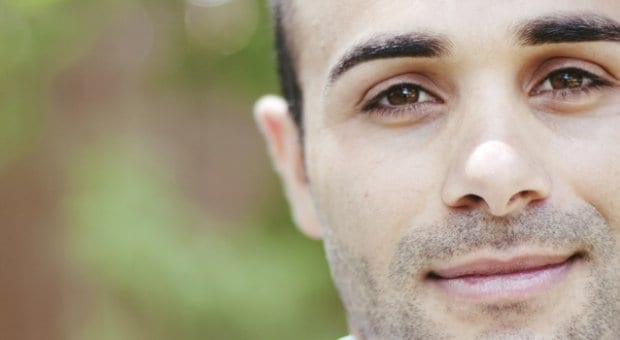
Immigration lawyer Michael Battista. Credit: Adam Coish

Rainbow Refugee co-founder Chris Morrissey. Credit: Leah Bromley
A secluded home in southern Manitoba, surrounded by spruce and ash trees that climb 25 metres into the sky, seems like an unusual place for a queer safe house. But that’s where you’ll find Hamed, a 28-year-old gay Iranian refugee. He lives there with his kind-of Canadian family, a middle-aged healthcare manager named Horst Backe and his partner, Mark Rabnett.
A few years ago, Backe and Rabnett got together with three men in Winnipeg and formed a Group of 5 or G5, a Citizenship and Immigration Canada category under which five or more Canadians can sponsor a refugee. They pooled together $15,000 and promised the federal department that they would essentially adopt a gay refugee for up to a year. At first, Backe worried about what he was getting himself into. “It ended up being not that much work at all,” he says.
When they got the okay from Immigration, the group went to Winnipeg’s James Armstrong Richardson Airport and met Hamed, a friendly, educated, easy-on-the-eyes guy who couldn’t speak much English but didn’t take long to learn. At first, Hamed lived with another couple in Winnipeg, but after a while, he decided he preferred to be outside the perimeter. “I’m not a city boy,” Hamed says in his new language. “I like the woods and the trees. I feel like I have privacy around here. It gives me a good feeling.”
It’s a much better feeling than Hamed had in Iran after his boyfriend’s family found out about their relationship and threatened to kill Hamed. “The last week in Iran was the worst week of my life,” he says, noting that he thought he was going to have a heart attack. Instead, he crossed the border into Turkey, introduced himself at the Canadian embassy in Ankara, and waited 17 long months for his refugee claim to be accepted. After that, he flew to Manitoba. Within a few months, he got a driver’s licence so that he can commute into Winnipeg and be a support worker for people with physical and mental disabilities.
Meanwhile, Backe has helped start a fledgling rights organization, called Reaching Out Winnipeg, to put out the word about queer refugees and encourage others to form Groups of 5. Many similar organizations have popped up across Canada in the past few years, including an even newer one in Halifax. Slowly, the federal government has also started getting involved in the issue. Yet the safe arrival to Canada of refugees like Hamed is still barely a trickle.
One of the first Canadian groups to help queer refugees, Rainbow Refugee, was formed in Vancouver 13 years ago. Originally, it had the same intent as Reaching Out Winnipeg — to help sponsor refugee claimants like Hamed who had escaped their home countries but hadn’t yet been accepted into Canada. But when the Vancouver group held its first meeting, most of the people in attendance were refugee claimants who had already arrived here on their own, either on tourist or student visas or illegally. The newcomers needed help making claims to stay — in the form of emotional support, legal advice and so on — so that became the focus for Rainbow Refugee.
According to the group’s co-founder Chris Morrissey, they had no choice. “We really have no money,” she says, “and we’re totally lacking in infrastructure.” Still, Morrissey estimates that, so far, Rainbow Refugee has helped about 800 newcomers win the right to stay.
But for every gay refugee who manages, against all odds, to leave a homophobic country and get to Canada (for an especially daring tale, see the accompanying sidebar about Moe Sonko), there are many more who don’t have the means to leave dire situations — either because they can’t get out of their home countries or because the neighbouring countries where they need to file refugee claims aren’t any safer.
For years now, Morrissey has been receiving at least one email plea per week from desperate gay people who want to get out of Africa, the Middle East, Russia or some other anti-gay hotspot. “The problem,” she says matter-of-factly, “is A, we’re all volunteers and B, we cannot financially afford all these people.” Then, two years ago, Citizenship and Immigration Minister Jason Kenney offered to help. Kenney promised that if persecuted queers could make it safely to another Canadian embassy and if Rainbow Refugee organized groups to sponsor them to come to Canada, the federal government would cover their expenses for the first three months.
Kenney’s plan is a $100,000 pilot project with a huge string attached. Rainbow Refugee isn’t allowed to use any of the money for infrastructure or advertising, which means it’s been a huge challenge for the volunteer group to get the word out to Canadian gays and lesbians and organize people who want to be sponsors while at the same time continuing to do its main job — helping refugees who are already here. In a statement to Xtra, Citizenship and Immigration Canada makes no excuses. The partnership with Rainbow Refugee, it says, is an “unprecedented program” that “showcases grassroots support” and “is not intended to provide infrastructure assistance to organizations.”
Over two years into the pilot project, the government says that “applications to sponsor five refugees have been submitted by the Rainbow Refugee Committee,” but Morrissey says that the group has sponsored only three people so far: a lesbian couple from a country Morrissey doesn’t want to disclose, as well as a man from Iraq who’s on his way. “It’s clearly a drop in the bucket,” she says.
According to Toronto immigration lawyer Michael Battista, the drops in Canada’s immigration bucket are becoming fewer and fewer. He says the federal government is dramatically limiting the number of refugees of all kinds that it allows into Canada. Battista is the head of a Toronto organization called Rainbow Railroad that is helping a gay man from Afghanistan who fled for his life to India. The man is trying to be sponsored by a Group of 5 at the Metropolitan Community Church, but the odds are severely stacked against him. This year, Canada plans to accept only 50 refugee claimants from India.
“You can see what we’re up against,” Battista says. “The overseas refugee resettlement program has really been scaled back. For all of Jason Kenney’s expressions of interest in helping refugees, the results have been disappointing.” In its statement to Xtra, Citizenship and Immigration Canada says it “aims” to increase resettlements by 20 percent every year. But recently, the Canadian Council for Refugees charged that the country resettled 26 percent fewer refugees in 2012 than 2011, the second lowest number in more than 30 years.
With so few refugees getting approval from Canadian embassies, Battista’s group focuses mostly on making contact with persecuted gay people in their home countries, then raising enough money (about $2,000 each) to help them escape. Since forming in 2006, Rainbow Railroad has assisted about 50 queer refugees, mostly from Iran and Jamaica, where the group has reliable on-the-ground contacts.
Battista’s group is also stepping up its fundraising. This past spring, Rainbow Railroad held a cocktail party that attracted 100 supporters and brought in $15,000. “Our goal is to hire a staff person, at least part-time, to respond to requests,” Battista says.
Even though there is less than a year to go in the federal government’s $100,000 pilot project, Citizenship and Immigration Canada tells Xtra it’s “premature to speculate on the future of the program.” Morrissey hopes the funding will continue, even though the vast majority of the money remains untapped and Rainbow Refugee hasn’t yet succeeded (with its limited resources) in convincing more people to sponsor queer refugees. “The more groups around the country that are willing to take this on, the better,” she says. “We can’t do it all here.” There’s no cross-country umbrella organization focused on helping gay refugees, and, so far at least, Egale hasn’t taken on the issue. Queer community centres aren’t making it a priority, either. “They’re mostly focused on the needs of people living in those cities,” Morrissey points out.
In Manitoba, Backe convinced Winnipeg’s Rainbow Resource Centre to tackle the issue of refugee resettlement and start accepting charitable donations on behalf of queer refugees. He also helped organize a second Group of 5 that is hoping to sponsor another gay refugee from Iran. But three months after the new group sent their application to the Department of Immigration, they still haven’t had a response.
Backe and his partner were gay rights activists in the 1980s, when AIDS first struck. But no issue has motivated them since then like the systemic challenges faced by persecuted queer people in other countries. “Our immigration system is designed to keep people out,” Backe says. “We keep claiming we have the most generous refugee policy in the world, but it’s not true.”
In its statement to Xtra, Citizenship and Immigration Canada claims that it’s increasing its resettlement target for Turkey so that more Iranians like Hamed can escape persecution in their home country. “Our government has made it clear that we will accept any and all gay Iranian refugees that the United Nations Human Rights Commission refers to us for resettlement,” the statement says. The government also claims that, in spite of those recent figures by the Canadian Council for Refugees, “we have one of the most fair and generous immigration and asylum systems in the world, accepting one in 10 resettled refugees — more than almost any other country.”
Backe and Rabnett’s generosity toward Hamed continues. It’s been more than a year since the Iranian arrived in Manitoba, plus he’s now financially independent, so the couple is no longer obliged to look after him. Yet the relationship continues. “I have a bunch of very good people around me,” Hamed says. “I can’t imagine leaving Horst and Mark and being alone here without the groups of people I’ve met.”
Backe wishes that more queer people in Canada would volunteer to sponsor refugees like Hamed. “We live in one of the most privileged countries in the world,” he says, tearing up. “When we learn about people in intolerable situations, we have a responsibility. And if we don’t step up as individuals, we can’t expect anyone else to, either.”
Moe’s journey
Want to hear an incredible story of queer resilience? Moe Sonko escaped from West Africa and came to Canada via the United States with a fake passport — and he started the journey as a teenager. Now that Sonko is safely in Vancouver (for now), the young refugee claimant is shockingly modest about it. “You gotta do what you gotta do,” he shrugs.
Sonko was born 27 years ago in The Gambia. From a young age, Sonko’s family viewed him as weird — and not in a good way. Essentially, the teen was flaming, considered “unnatural,” and his dad sent him to a voodoo doctor in a faraway village to be cured. “I didn’t have a choice,” Sonko says. “My dad thought I was mentally ill.” Sonko had his gay lisp practically beaten out of him.
It could have been worse. The Gambian president once said he would “cut off the head” of any gays he found in the country. Officially, homosexuality is illegal there and punishable by up to 14 years in prison.
When Sonko turned 18, he scored a three-month tourist visa to the United States. He boarded the plane with no intention of ever returning.
Sonko’s life in America started in New York, but eventually, he made his way west to Seattle, where he worked illegally as a nursing assistant. There, he got the idea to seek refugee status, but one lawyer after another told him the same thing: you won’t make it here. Go to Canada.
So, last fall that’s exactly what Sonko did. With a friend’s American passport in hand, he boarded the train to Vancouver and hoped that customs officials wouldn’t be able to distinguish one black man’s face from another. “It was the longest three hours of my life,” he says of the train trip. “I was terrified. I couldn’t even talk.”
When Sonko arrived in Vancouver, his only contacts were a couple of volunteers from Rainbow Refugee who had given him advice while he was still in the States. Four days later, Sonko applied for refugee status. Seven months later, he’s still waiting for a hearing date. For now, the African who loves Britney Spears and bow ties is living on welfare — $670 per month — with four roommates. He’s about to get a work permit, though.
“I’m surviving and I’m happy,” he says. Except for one thing. The uncertainty of his situation (will he be allowed to stay?) is causing him to lose sleep every night. “I’m tired of waiting and not knowing what’s happening,” he says. “I worry about not having a positive hearing.” If Sonko doesn’t, he could be right back where he started, in the country where he swore he would never return. — Kaj Hasselriis
How to help
There are many ways you can help a gay person from a homophobic country seek refuge in Canada. One way is to get together with a few other people and sponsor them, like Horst Backe and his partner did. To ask Backe for advice on how they did it, email reachingoutwinnipeg@gmail.com.
Rainbow Refugee’s Chris Morrissey is also a fountain of information and advice on this topic, especially in regard to how you can take advantage of funds from the federal government. You can reach her by emailing sponsorship@rainbowrefugee.ca.
Traditionally, churches have also been very involved in helping to sponsor refugees. The United Church and the Metropolitan Community Church have both worked with queer organizations to become sponsorship agreement holders with Immigration Canada and to sponsor gay people from other countries.
If you’d like to assist persecuted gay people in their home countries and help them get to Canada without direct government support, contact Rainbow Railroad at info@rainbowrailroad.ca.
Refugee claimants need lots of support when they arrive in Canada. All the organizations mentioned above, and a few others across Canada (many of them affiliated with queer community centres), need your help in assisting newcomers. Seek them out and lend a hand.

 Why you can trust Xtra
Why you can trust Xtra


